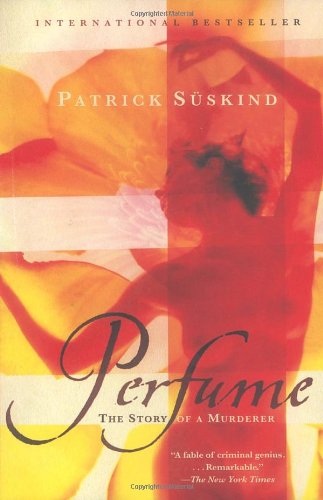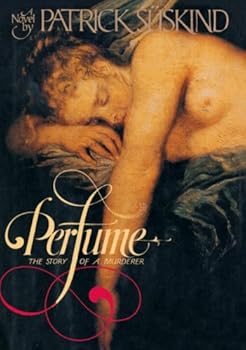
![]() Perfume: The Story of a Murderer by Patrick Suskind, translated into English by John E. Woods
Perfume: The Story of a Murderer by Patrick Suskind, translated into English by John E. Woods
If you are anything like me, then Perfume: The Story of a Murderer will prove a most tantalising title. And, if you are anything like me, you will not be disappointed upon delving inside. This is a story of human nature at its most despicable and scent at its most sublime, a heady combination of depravity and olfactory beauty.
Published in 1985, Perfume fast became a best-seller in Patrick Suskind’s native German. I can only assume the translation is sublime (indeed John Woods received a PEN Translation prize in 1987 for his work on this novel), as sadly I cannot read a word of German in order to compare. This always leaves me perplexed. I can’t help feeling there will always be something of the author I am missing. But perhaps that is a discussion for another day.
 Our titular murderer is Jean-Baptiste Grenouille, born quite literally into the rubbish of eighteenth-century Paris. Orphaned as a baby he is taken in by a monastery, only to be cast out soon after, for he inspires a sense of dread in those around him. This surprising reaction stems from one curiosity — Grenouille smells of nothing at all.
Our titular murderer is Jean-Baptiste Grenouille, born quite literally into the rubbish of eighteenth-century Paris. Orphaned as a baby he is taken in by a monastery, only to be cast out soon after, for he inspires a sense of dread in those around him. This surprising reaction stems from one curiosity — Grenouille smells of nothing at all.
The story races through Grenouille’s early life, which is pitifully hard. From an orphanage to back-breaking work at a tannery he is abused and undermined at every turn. Yet the child Grenouille is not bothered by cruelty and has no desire to be loved by those around him. Instead of these human desires he is gripped by a private obsession with smell. Grenouille is gifted with a nose like no other. He can identify any person or object by smell alone and store it in his memory forever.
Nursed privately, Grenouille’s gift finally comes to fruition upon a chance encounter with perfumer Giuseppe Baldini. The hapless Baldini has no desire to take on this unremarkable and sinister boy, but when he sees what Grenouille can do with scent he is awakened to the business possibilities. And so Grenouille creates masterpieces and Baldini makes money. But the peace is broken when one day, on the streets of Paris, Grenouille is assaulted by a smell more stunning than any he has encountered before. It is this smell that stirs the true evil in his soul and so sparks his journey across France on a quest to create the most perfect perfume in the world.
Perfume won the World Fantasy Award in 1987 and is one of those subtle works of fantasy, tied closely with historical fiction, that is not overtly fantastical. The magic lies in the exaggerated impact of scent and in Grenouille’s remarkable gift, which we know in our hearts to be impossible. (I would forgive a reader for becoming so immersed in the story that it does not seem impossible at all.)
However I will temper all of the positive things I have to say by admitting that at times I found myself wondering whether I was really enjoying Perfume. I concluded that I was, very much so, but not in the normal way. Suskind has gone out of his way to ensure that every character is horribly flawed. No one escapes this treatment and whether they are vain, deceitful, cruel or disgusting, each and every one is impossible to like. When we are finally introduced to a seemingly kind and noble father he is smeared by the revelation that he harbours a sick lust for his own daughter. And so a word of warning — you will not fall in love with the characters in any normal sense. But that will certainly not stop you enjoying them.
It is the same story with the setting. Do not expect the romantic Paris of the mind’s eye. Instead, revel in its filth and grime.
All this serves as a stunning contrast to the perfumes. The time spent in Baldini’s perfumery is a delight. I often favour the building of a story, when the author, less concerned with pulling strands together, has more time to tease us with sensory detail. Suskind treats his readers to a veritable feast of description — the oils, the herbs, the plants, the most beautiful smells on earth.
It was not a scent that made things smell better, not some sachet, some toiletry. It was something completely new, capable of creating a whole world, a magical, rich world, and in an instant you forgot all the loathsomeness around you and felt so rich, so at ease, so free, so fine…
Amid all this Grenouille himself is a most interesting villain, intensely dislikeable for unusual reasons. He is not the type of murderer we are familiar with. It is not rage or lust or revenge that drives him. True, he harbours a general disgust for humankind but it is rarely overwhelming. In fact he is largely emotionless, never happy, never angry, never desolate. Suskind has created a freak of human nature and he is all the more creepy for it. (If you are tempted to watch the movie — I have not, but I have seen pictures — be warned that the actor playing Grenouille is ten times too sultry to represent the small, hunchbacked Grenouille of the book.)
It is therefore a relief that Grenouille’s story is intermingled with those of Suskind’s other characters. Perfume frequently veers off at tangents to tell us more about those other dislikeable, but infinitely more relatable souls that cross Grenouille’s path. The result is often surprisingly humorous, pitiful and understandable in equal measure. This is a story of humanity despite Grenouille’s lack of it.
Overall I find that I cannot fault Perfume. It is flawlessly written, perfectly paced and I have the eerie feeling it will never truly leave me. The ending, which I certainly won’t ruin, is a perfectly depraved finale for a book so quick to shine a light on the depth of human weakness. I can think of no better way to sum up than to say that this is a story about perfume, and the story of a murderer, and if that appeals, read it, read it now.



The thing about translation is an issue. It is almost like a separate book, or a retelling, and we do have to trust the translator. I liked it when Hugo winner Liu last year complemented his translator, Ken Liu — you can trust that the story is an accurate interpretation.
And this book sounds creepy and wonderful.
Yes, it seems like a phenomenally important job to me! It’s not something I’ve ever thought much about but there must be lots of translators who are extremely talented authors in their own right.
Great thoughtful review of a book I absolutely loved!
Thanks Bill! Have you watched the film? I’m thinking of tentatively giving it a go.
I did see it (on TV). I don’t recall much about it though. I think it was probably OK (maybe even good), though of course lacking the sensory nature of the prose. My guess is I’d remember it better if I really didn’t like it, so it might be worth a viewing.
Sublime review, Katie! I think this book is seductively sinister and completely original. I will definitely move it up my list, maybe next year. I saw the film several years ago and it was excellent, completely creepy and you truly felt the grime, stench, and powerful perfumes of Paris. Highly recommended.
Thanks Stuart, I’ll check the film out – were you inspired to use the word sublime because I managed to use it twice in one paragraph – I will ever be able to read this review back without it bugging me!